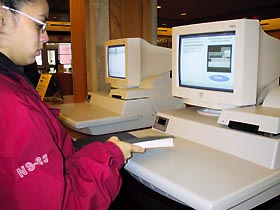|
This is an archived article.
For the latest news, go to the Advance
Homepage
For more archives, go to the Advance Archive/Search Page. |
||
|
Checking Out Books Is Plain
Sailing With New Technology By Suzanne Zack If it seems like you're sailing out of Babbidge Library these days, it's no illusion. Major technological changes in the library's circulation and security systems now enable users to leave the building in mere seconds. The new Checkpoint Intelligent Library System has enabled the Library to eliminate the exit control desk, where attendants once searched users' bags for library materials not checked out, so that users can leave more quickly, says Barbara Mitchell, the Libraries' circulation database coordinator and Checkpoint system administrator. "Instead of leaving the library through a single mediated exit, users now depart through two new unmediated exits that provide security for library collections without requiring an invasive search," she says.
With the Checkpoint system, library users scan the bar code on their University ID and pass a book over a reader pad at one of two self-charge stations. Sensors at the plaza level exits "recognize" whether a book has been checked out, even if it's in a backpack or briefcase with other books. If materials haven't been checked out, lights and an alarm are activated and the exit gate locks. During the summer, library staff prepared the collections for use with the new system, redesigned the plaza level, and combined circulation, reserve and exit control operations at two service desks, instead of four. The changes freed up a number of staff for other tasks. Checkpoint, an integrated collection management system built on radio frequency identification technology, communicates with the library's circulation system, instantly identifying the circulation status of an item. Security, circulation, and inventory control functions all depend on this single technology. Checkpoint, of Thorofare, N.J., has been supplying the system for years to businesses nationwide for inventory control and, more recently, to libraries. The system is installed at the University of Pennsylvania's Annenberg Library, Rockefeller University Library, and at many large public libraries in the country. Babbidge Library is the first academic research library of its size to install the system and is Checkpoint's largest library contract to date. Use of radio frequency identification technology opens the door to conveyor sorting of returned materials and automated check-in of returned books, says Nancy Orth, director of library access services. Combining use of the Checkpoint Intelligent Library System with a "smart" University card may in the future enable library users to charge out materials simply by walking through the exit gate. |

